
New OLYMPUS OMCL-AC series cantilevers are designed for AC mode AFM in air.
OMCL-AC Series has a tetrahedral tip on the exact end of the cantilever.
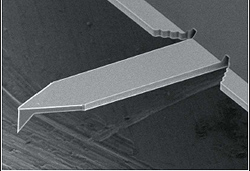
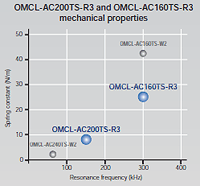
| Coating Metal (Tip side / Reflex) |
Total number of chips | ||
|---|---|---|---|
| OMCL- AC160TS-R3 |
OMCL- AC200TS-R3 |
Non / Al | 100 |
| OMCL- AC160TS-C3 |
OMCL- AC200TS-C3 |
Non / Al | 24 |
| OMCL- AC160TN-R3 |
OMCL- AC200TN-R3 |
Non / Non | 100 |
| OMCL- AC160TN-C3 |
OMCL- AC200TN-C3 |
Non / Non | 24 |
| OMCL- AC160TS-R3 |
OMCL- AC200TS-R3 |
||
|---|---|---|---|
| OMCL- AC160TS-C3 |
OMCL- AC200TS-C3 |
||
| OMCL- AC160TN-R3 |
OMCL- AC200TN-R3 |
||
| OMCL- AC160TN-C3 |
OMCL- AC200TN-C3 |
||
| Cantilever | Shape | Rectangular | |
| Dimensions (LxWxT, µm) | 160x40x3.7 | 200x40x3.5 | |
| Resonance frequency (in air, kHz) |
300 (±100) | 150 (±50) | |
| Spring constant (Stiffness, N/m) |
26 (typ.) | 9 (typ.) | |
| Material | Silicon (n-type, 0.1 – 0.4 Ω・cm) | ||
| Tip | Shape | Sharpened tetrahedral, ‘Tip View’ structure | |
| Length (µm) | 14 | ||
| Tip radius (nm) | 7 (typ.) | ||
| Tip angle (Front) |
0 degree | ||
| (Back) | 35 degree | ||
| (Side) | Symmetric, Cone half-angle 9 degrees or less | ||
| Material | Silicon (n-type, 0.01 – 0.02 Ω・cm) | ||
| Chip | Shape | Rectangular cross section, Beveled chip-shoulder | |
| Dimensions (LxWxT, mm) | 3.4×1.6×0.3 | ||
| Packaging | Chip configuration in the box | Pre-separated chip | |
| Storage box | Plastic box with a tacky coating | ||
The mid-range mechanical properties [resonance frequency: 150kHz, spring constant: 9 N/m (typ.)] mean that the OMCL-AC200TS-R3 is tailored to any surface from soft to hard.
The stiffer middle mechanical properties [resonance frequency: 300 kHz, spring constant: 26 N/m] means that OMCLAC160TS-R3 is redesigned for revealing sample surface precisely and gently.
The cantilever is made from silicon with a low surface resistance of 0.1 – 0.4 Ω・cm.
This means 1/20 resistance of our conventional cantilevers.
The probe can be easily positioned at the exact point of your interest. The probe is located at the exact end of the cantilever so that the probe apex is not obscured during optical observations.
The probe is tetrahedral, ideally point terminated. The probe apex 1 micron or more is further sharpened.
The ideally parallel side-walls of the chip make tweezing easy and eliminate problems with chipping and debris.
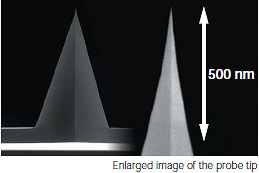
Check Scan line profile and enlarged view of the tip apex.
Many researchers in biology and chemistry field have interests in AC mode AFM in fluid. For measuring a soft sample like a biology cell, OMCL-TR and -RC series cantilevers are recommended rather than OMCL-AC series cantilevers. See the sample images taken by OMCL-TR400PSA- and OMCL-AC120TS-.
Below are SEM images of a Tetra tip from the front and side, and the last is a magnified view from side.



Tip shape : sharpened tetrahedral (tilted)
It shows good symmetry viewed from the front and is inclined viewed from the side.
Considering this geometric feature, choose the fast scan (X) direction.

New concept chip has parallel side-walls.
The ideally parallel side-walls of the chip make tweezing easy and eliminate problems with chipping and debris.
| OMCL- AC160TS-*3 |
OMCL- AC200TS-*3 |
|
|---|---|---|
| OMCL- AC160TN-*3 |
OMCL- AC200TN-*3 |
|
| L (µm) | 160(±15) | 200(±20) |
| W (µm) | 40(±2) | 40(±2) |
| t (µm) | 3.7(±0.5) | 3.5(±0.6) |
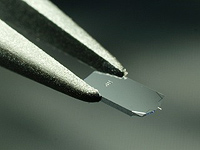
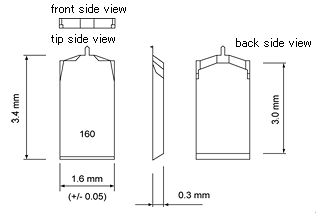
Thin aluminum film with the thickness of 100nm is coated on the cantilever for reflecting light from the deflection sensor in the AFM equipment. High reflex for high S/N sensing can be expected.
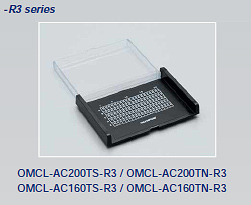
Silicon cantilevers, model OMCL-ACxxxxx-R3, are provided with 100 pre-separated chips.

Silicon cantilevers, model OMCL-ACxxxxx-C3, are provided with 24 pre-separated chips.